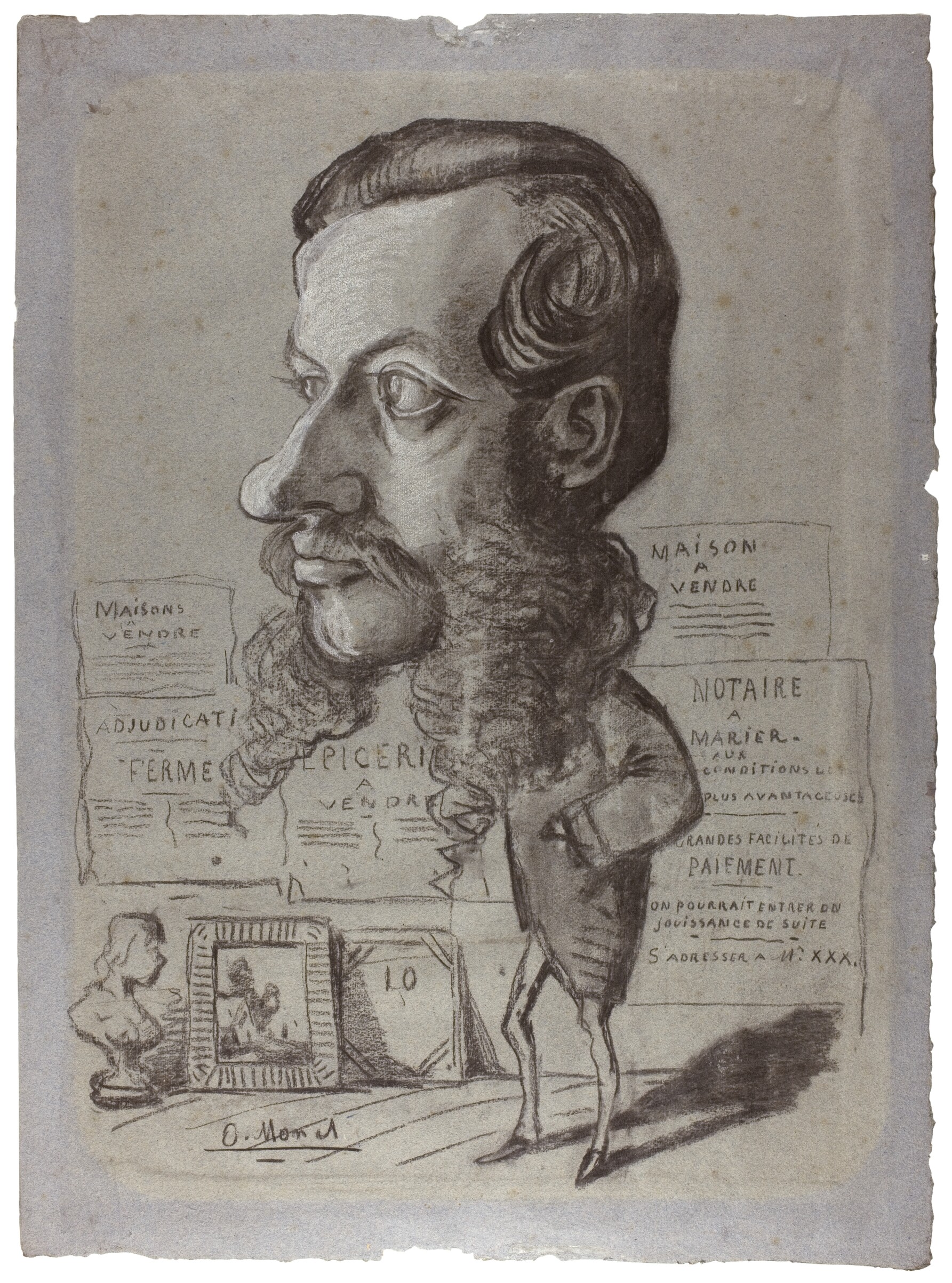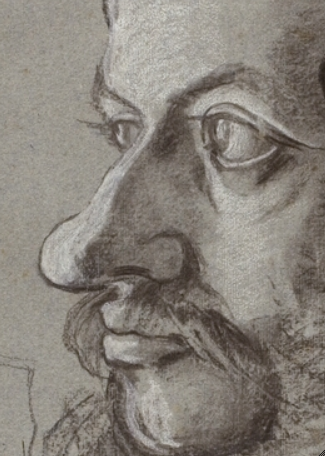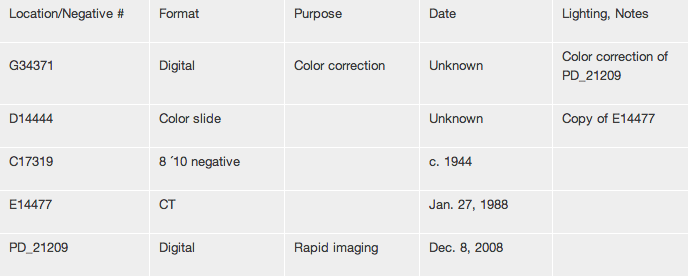Technical Report
Technical Summary
Claude Monet’s Caricature of Léon Manchon was drawn in charcoal on blue [glossary:laid] paper. The slightly toothy surface of the sheet captured the charcoal, allowing the artist to create rich, velvety passages in the figure's head. White chalk was used along the front of the face to establish highlights, and the blue tonality of the paper establishes a middle value in the composition. There is selective [glossary:stumping] in the nose, chin, eyes, and side of the face that creates shading and modeling in the head (fig. 2.1). Stumping also appears to have been used in the figure’s coat for tonal variation. The background elements are defined with fine charcoal lines.
Signature
C. Monet (recto, bottom left, in black chalk).
Media and Support
Support Characteristics
Primary paper type
Blue (discolored to yellowish gray), moderately thick, slightly textured laid paper.
Watermark
MFDT, vertical, lower center.
Chain line orientation and frequency
Horizontal, 28–29 mm
Laid line frequency
90–100 mm
Furnish
Ivory, dark-blue, medium-blue, and red fibers.
Formation
Slightly uneven; in transmitted illumination, the paper is thicker at the center left, top, and bottom.
Other characteristics
The left and top edges are cut straight. There is a deckle edge at the right and bottom.
Dimensions
612 × 452 mm
Preparatory Layers
There are no artistic surface alterations or coatings visible in normal conditions, under [glossary:UV] illumination, or under magnification. Under UV illumination, there is a pale-yellow visible-light [glossary:fluorescence] overall on the recto of the paper that is characteristic of a light gelatin surface [glossary:sizing].
Media Characteristics
Charcoal was used to create the image overall. There is selective stumping in the nose, chin, eyes, and side of the face that create shading and modeling in the head. Stumping also appears to have been used in the figure’s coat for tonal variation. Passages of white chalk along the front of the face establish highlights.
There is no drawing media on the verso.
Compositional Development
No revisions or changes, other than intended experimentation with coloring, are visible in the composition in normal conditions or under magnification.
Surface Treatment
No fixatives or coatings are visible under normal conditions, under UV illumination, or under magnification.
Condition History
The paper has discolored to a yellowish gray in the image area due to excessive light exposure through a former window-mat opening. There are also light-reddish-brown [glossary:foxing] spots throughout. Undulations are visible overall within the image, which are most pronounced at the top corners. Moderate deformation of the paper sheet is visible around the perimeter, corresponding to an approximately four-centimeter-wide band of adhesive residue around the perimeter on the verso of the sheet; this adhesive reemits a bright-yellowish-white visible-light fluorescence under UV illumination. A small area of this adhesive is also visible at the center top edge on the recto. The undulations and the deformation are likely the result of a former mounting. There are numerous losses and tears around the edges that may have occurred during removal from the former [glossary:mount]; the largest losses, with associated skinning, are visible at the center top and center bottom edges. The deckle edge along the right and bottom is darkened due to penetration of the adhesive into the paper.
There is a scratch across the figure’s proper left eye that removed some of the charcoal media. Some light transfer of media is visible overall.
Kimberly Nichols
Selected References
Hugh Edwards, “The Caricatures of Claude Monet,” Bulletin of the Art Institute of Chicago 37, 1 (Jan. 1943), p. 71.
John Rewald, The History of Impressionism (Museum of Modern Art, New York, 1946), p. 35 (ill.).
William C. Seitz, Claude Monet (Abrams, 1960), pp. 13; 50, fig 65.
Yvon Taillandier, Monet (Flammarion, 1963), p. 47 (ill.).
Raymond Cogniat, Monet and His World (Viking, 1966), pp. 10 (ill.), 131.
Charles Merrill Mount, Monet, A Biography (Simon & Schuster, 1966), p. 396.
Hideji Takashima, Manet, Monet, Seurat (Holp Shuppan 1970), chap. 4 (ill.).
Daniel Wildenstein, Claude Monet (Fratelli Fabbri, 1971), pp. 84; 93 (ill.), no. 51.
John Rewald, History of Impressionism (Museum of Modern Art, New York, 1973), p. 39 (ill.).
Daniel Wildenstein, Claude Monet: Biographie et catalogue raisonné, vol. 1, Peintures, 1840–1881 (Bibliothèque des Arts, 1974), pp. 6, 15 (ill.), 40.
Rodolphe Walter, “Claude Monet as a Caricaturist: A Clandestine Apprenticeship,” trans. Eric Young, Apollo 103 (June 1976), pp. 489, 492.
Harold Joachim and Sandra Haller Olsen, French Drawings and Sketchbooks of the Nineteenth Century, vol. 2 (University of Chicago Press, 1979), p. 70, no. 4B1.
M. Shuji Takashina, Monet (Seibu Museum of Art, 1981), n.pag. (ill.).
William C. Seitz, Monet: 25 Masterworks (Abrams, 1982), p. 11 (ill.).
Daniel Wildenstein, Claude Monet: Catalogue raisonné, vol. 5, Supplément aux peintures: Dessins; Pastels; Index (Wildenstein Institute, 1991), p. 152, cat. D481 (ill.).
Virginia Spate, Claude Monet: Life and Work (Rizzoli, 1992), p. 15, fig. 5.
Andrew Forge, Monet (Art Institute of Chicago, 1995), pp. 8; 10, fig. 3.
Matthias Arnold, Claude Monet (Rowohlt, 1998), p. 11 (ill.).
Catherine Morris, The Essential Claude Monet (Abrams, 1999), p. 14 (ill.).
Souren Melikian, “Beyond Impressions: The Monet You Didn’t Know,” New York Times, Apr. 13, 2007. http://www.nytimes.com/2007/04/13/arts/13iht-melik14.1.5269879.html?pagewanted=all.
Pascal Bonafoux, Monet (Perrin, 2007), p. 40.
Frédéric Martinez, Claude Monet, une vie au fil de l’eau (Tallandier, 2009), p. 23.
Ségolène Le Men, Monet (Citadelles & Mazenod, 2010), pp. 42; 44, fig. 32; 44.
Constance C. McPhee with Nadine M. Orenstein, “‘Shoot Folly as It Flies’: Humor on Paper,” in Infinite Jest: Caricature and Satire from Leonardo to Levine, exh. cat. (Metropolitan Museum of Art, New York, 2011), pp. 10; 11, fig. 6; 42.


